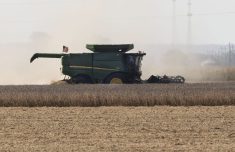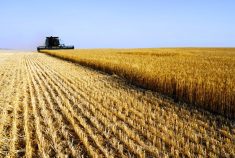Aaron Brower believes almost 180 head of cattle have been stolen from his southern Alberta ranch in the last 10 years.
He reported the disappearances to Livestock Inspection Services and the RCMP, but a lack of physical proof makes it unlikely the cattle will be found, said the newly elected president of the Western Stock Growers Association.
He said he has lost calves, yearlings and cows, with thieves making off with seven to 25 at a time.
Brower’s problem is part of a bigger issue in Alberta, which the stock growers association responded to by setting up a $50,000 reward leading to the arrest and conviction of people stealing livestock. The money came from private donations and seems to have acted as a deterrent.
Read Also

Alberta harvest wrapping up: report
Harvest operations advanced to 96 per cent complete in Alberta as of Oct. 7, with only a few late-seeded cereal and canola fields remaining, according to the latest provincial crop report.
“After we did the reward thing it kind of slowed down at bit, but it is still around,” Brower said.
His ranch is at Aden, Alta., 30 kilometres north of the U.S. border. He suspects many of his stolen cattle ended up in Manitoba because the province has no brand inspection service and livestock would be easy to sell.
All his animals are branded, but he doesn’t believe ear tags are a deterrent.
“I have no faith in the tags for that kind of stuff. For the honest guy they work just fine, but in a theft position it is easy to get rid of,” he said.
His nearest neighbours are far away, and the extent of oil field activity in his area means no one is sure what is going on when they see lights in fields at night.
He thinks the thieves are well organized.
“I’m in rough country here, so it’s not like you stop at the side of the road and haul them in. You have to have a plan of attack,” he said.
“It has been an ongoing problem, whether the prices are good or not.”
Thefts of cattle and horses remain at a consistent level each year, said RCMP livestock investigator cpl. Chris Reister.
About 580 cattle and 70 horses were reported stolen in the province in the last year.
“This is relatively consistent with what we have from other years. The problem we have is some people don’t report,” he said.
Stolen livestock can move into other provinces where there is no brand inspection, and they are subsequently sold or butchered. RCMP also suspect financed cattle have been sold in the United States.
He said producers need to report suspected thefts as soon as possible. As well, livestock should be branded.
“The biggest thing we rely on is brands. If you are missing a horse or a cow that doesn’t have a brand, it is very difficult for the livestock inspectors to catch them at the markets,” he said.
“If you are missing 10 black Angus heifers and there is no way to identify them, it is very difficult.”
Most thefts seem to occur in southeastern Alberta, where the herds and pastures are large and there are few people. Problems are fewer in the Highway 2 corridor because the area is heavily populated and neighbours are likely to notice suspicious activity.
Reister said thieves are brazen and well organized. They know how to capture livestock and are prepared with loading chutes and trucks.
“It is not the typical opportunist type thieves who steal some tools from a farm site. You have to have a skill set to load cattle,” he said.
Producers are encouraged to keep an accurate count of the herd throughout the year.
Consider installing motion sensor cameras at key entry points that can capture a license plate number. These are available from hunting stores.
Lock or tie gates a certain way that will be noticed if someone else entered the property.
Suspects can be charged with theft over or under $5,000. A conviction for a large theft could net a maximum of 10 years in prison. Courts have historically taken cattle theft seriously.
Thefts can be reported to any local RCMP detachment.
RCMP livestock investigators work with the brand inspectors from Livestock Inspection Services to track lost or stolen animals. Investigators are also part of the Western States Livestock Investigators Association so they can work with inspectors in British Columbia, Saskatchewan and the states where brands are used.
For more information, contact Reister at 403-809-1706.

















